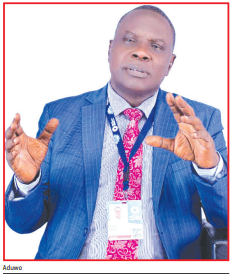Permanent Representative of the Centre for Convention on Democratic Integrity (CCDI) to ECOSOC/United Nations, Olufemi Aduwo, in this interview, speaks on the Senate probe of the Nigerian National Petroleum Company Ltd (NNPCL) and the Petroleum Industry Act, among other issues
Given that all Organisation of Petroleum Exporting Countries (OPEC) member states maintain national oil companies as strategic assets, do you believe that selling Nigerian National Petroleum Company Limited (NNPCL) and its refineries would serve Nigeria’s long-term development interests, or will it undermine the nation’s strategic control over the sector?
Selling off the NNPCL and its core assets, especially the refineries, would be a strategic error. In the oil and gas industry, the national oil company is not just a commercial entity, it is a sovereign instrument. All OPEC countries retain theirs because it anchors their upstream and downstream value chains, controls reserves booking and provides a lever in global energy diplomacy.
Privatising such assets in a commodity market as volatile as crude oil means Nigeria would lose strategic control over production quotas, domestic supply security and the ability to leverage our reserves in bilateral or multilateral negotiations. Beyond that, in economic terms, the NNPCL’s assets are what we call ‘cash-flow positive under the right through put conditions.’
The refineries, if fully rehabilitated, can move from loss-making to profitable within 18-24 months by processing domestic crude at market reflective yields. Countries like Saudi Arabia with Saudi Aramco and the UAE with ADNOC have shown that the optimal approach is partial equity divestment through public offerings while retaining sovereign majority control.
This provides capital inflow, enforces corporate governance through market discipline, but still keeps strategic decision making in national hands. Even Petrobras in Brazil, despite past scandals, has remained state controlled while bringing in private capital for operational efficiency.
The smart play for Nigeria is not a fire sale of strategic assets, but restructuring NNPCL into a lean, performance-driven entity, ring fencing upstream revenue streams, commercializing downstream operations and leveraging partnerships for technology and market access. Selling it outright would be like burning the seed corn to cook dinner, short-term gain, long-term loss.
Critics often say that instability in leadership and frequent policy shifts within regulatory agencies and the NNPCL discourage long-term investment. Why is management stability critical for Nigeria’s oil and gas sector?
Management stability is not just an internal matter; it is a signal to the world. In the oil and gas sector, projects often run into billions of dollars and span decades. Investors make commitment only, when they trust that the people running the system today will still be there tomorrow to honour agreements and maintain policy direction.
When the leadership of regulators or NNPCL changes too often or even appears under threat, it sends a message of uncertainty, which is poison to long-term capital. That is why I would urge President Bola Tinubu to be cautious. In our political climate, rumour is part of governance, stories are planted, sometimes deliberately, to undermine key figures.
A cabal can emerge and feed the presidency half-truths or selective information, creating instability without the President even realising it. He must filter information carefully, cross check with multiple sources and weigh the broader impact before reshuffling competent management.
The NNPCL is at the centre of Nigeria’s economic lifeline, especially now that we are competing for investment with countries offering stable leadership and predictable policy. Undue disruption at the top could cost us billions and once investors walk away, it can take years to regain their confidence.
Given Nigeria’s vast untapped gas reserves and the global shift towards cleaner fuels, do you believe President Tinubu’s administration is doing enough to attract the kind of foreign investment needed to transform the gas sector into a long-term revenue engine for the country?
I think we are still moving too slowly. Nigeria has over 200 trillion cubic feet of proven gas reserves, yet the global race for gas markets will not wait for us. Other nations Mozambique, Tanzania, Qatar are already securing multi decade supply contracts with Europe and Asia.
What investors want from Nigeria is not just potential, but predictability: clear fiscal terms, fast regulatory approvals, secure infrastructure and the assurance that they can move their capital in and out without headaches. The Petroleum Industry Act (PIA) gave us a good framework, but implementation has been sluggish.
If President Tinubu wants Nigeria to be a top five LNG exporter within the next decade, he must treat gas as a national economic emergency lock in investor friendly policies for 15-20 years, aggressively market our reserves. The oil market is volatile, but gas could be our ticket to sustained, cleaner revenue.
There are allegations that a Senate committee was seeking as much as N200 trillion from the NNPCL, a claim that has stirred public outrage and fueled perceptions of corruption. How should such allegations be handled to protect the integrity of national institutions and maintain investor confidence?
The first thing we must do is separate fact from political theatre. We have been here before, in the late 1970s, the so-called ‘$2.8 billion stolen’ from the NNPC turned out, after investigation, to be nothing more than a rumour that grew legs in a politically charged climate. That lesson should guide us now.
That figure (N200 trillion) is an astronomical figure far above the entire 2025 Federal Government budget. For such a sum to vanish from NNPCL’s accounts undetected would imply the complete failure of multiple internal controls, external auditors and regulatory oversight. The NNPCL is not a single cashbox; it is a group structure with many subsidiary companies, joint ventures and production sharing contracts.
Its operations are highly technical, involving crude lifting schedules, swap arrangements, LNG sales, and dollar denominated transactions routed through global financial systems. That is why I find it hard to believe such a vast amount could simply ‘disappear.’ Allegations of this magnitude must be backed by documentary evidence and subjected to independent forensic audit, not trial by headline.
Reckless claims can damage investor confidence, weaken the credibility of our legislature and destabilise a sector that is already under competitive pressure from other oil-producing nations. Due process, not rumour, is what would protect the integrity of our institutions.
Since the appointment of Mr. Bayo Ojulari as GCEO of the NNPCL, there have been various allegations and insinuations, ranging from questions over contract awards to claims of internal policy rifts. Some of these come from political actors, others from within the industry itself. How should such allegations be addressed in a way that preserves the credibility of both the GCEO and the institution he leads?
In my view, many of the allegations swirling around Mr. Bayo Ojulari must be understood in the broader context of Nigeria’s oil industry politics.
The GCEO is not a career insider groomed within the traditional NNPCL bureaucracy; he is the first Group Managing Director/Chief Executive Officer of NNPCL to come directly from the private sector, with decades of deepwater and international management experience.
That fact alone unsettles certain entrenched interests who have long thrived under the old order. Let us be frank, the Nigerian oil sector is not free of vested interests. There are operators and middlemen whose influence, access and informal privileges depend on maintaining a particular status quo.
So, a reform minded outsider with global corporate discipline poses a threat to those channels. It is, therefore, unsurprising that some of the noise we hear is amplified and even sponsored by individuals and groups who fear losing their hold over lucrative contracts, opaque supply arrangements or regulatory loopholes. I am not suggesting that the GCEO is above scrutiny. In fact, healthy accountability strengthens leadership.
But there is a clear difference between evidence-based oversight and the kind of whisper campaign designed to erode public confidence before a reform agenda has even taken root.
The presidency, regulators and the public should be alert to that distinction. President Tinubu appointed Mr. Ojulari not for his familiarity with political patronage systems, but for his record of performance in results driven, competitive environments.
If we undermine him before he has the chance to deliver, we will send a chilling signal to the very calibre of professionals we claim to want in our public corporations. The oil industry is the backbone of our economy, it deserves leadership that is judged by results, not by the volume of rumour manufactured by those with something to lose





